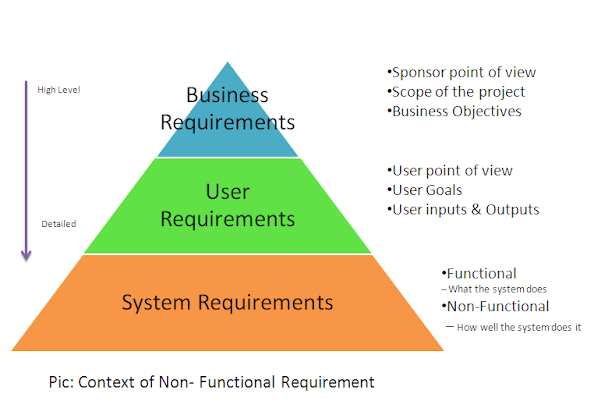Gathering the correct and complete requirements is one of the most important things in software development. Incorrect and incomplete requirements are the main reasons why the project fails. If you are in software development, you may have come across terms like functional and non-functional requirements. If you are wondering why a prototype takes 2 weeks but actual application development requires around 3 to 4 months of development; think of non-functional requirement. When someone told you to build software, what they tell you is what that software should do like allow you to trade on a certain market, but they don't tell you about security, performance, load, and other stuff, this is what I called non-functional requirement.
The obvious difference between functional and non-functional requirements is, former is specified by its users, business analysts and it's part of the software's feature list.
For example, the functional requirement of a trading application is to receive the order, enrich, transform and send it to Stock Exchange, but the non-functional requirement is not specified by the user, it's rather thought by a Software architect, Subject Matter Experts, Technical lead and Support peoples.
For example, for this same trading application non-functional requirements could be Failover and Recovery, logging, auditing, latency, and other performance characteristics that, the application should be able to run continuously, can process 5K orders per second, etc. Support people can also ask functionality require to add users, give access, revoke access, monitoring, etc.
Every application in software development has one or other kind of non-functional requirements. In this article, we will learn more about the difference between functional and non-functional requirements in software and product development.
1. Functional requirement is specified by the User, while the non-functional requirement is specified by technical people like Architect, Technical leaders, and software developers.
2. Functional requirement is also the activity System must perform, on other hand non-functional are depending upon the criticality of the application. For example, if your application is not critical and you can live with downtime, you may not need to develop complex failover and disaster recovery code, reducing your application's total development time.
3. Functional requirements define a software’s functionality i.e. what can they do, while non-functional requirements define, other things which are not required by the user but required by a service provider or software itself like logging is a non-functional requirement to support an application, not directly used by the user but essential to troubleshoot any issue in a production environment.
4. Non-functional requirements are sometimes defined in terms of metrics (something that can be measured about the system) to make them more tangible.
5. Non-functional requirements may also describe aspects of the system that don't relate to its execution, but rather to its evolution over time (like maintainability, extensibility, documentation, etc.).
Functional vs Non-functional Requirements
Here are a couple of differences between functional and non-functional requirements in the software development process :1. Functional requirement is specified by the User, while the non-functional requirement is specified by technical people like Architect, Technical leaders, and software developers.
2. Functional requirement is also the activity System must perform, on other hand non-functional are depending upon the criticality of the application. For example, if your application is not critical and you can live with downtime, you may not need to develop complex failover and disaster recovery code, reducing your application's total development time.
3. Functional requirements define a software’s functionality i.e. what can they do, while non-functional requirements define, other things which are not required by the user but required by a service provider or software itself like logging is a non-functional requirement to support an application, not directly used by the user but essential to troubleshoot any issue in a production environment.
4. Non-functional requirements are sometimes defined in terms of metrics (something that can be measured about the system) to make them more tangible.
5. Non-functional requirements may also describe aspects of the system that don't relate to its execution, but rather to its evolution over time (like maintainability, extensibility, documentation, etc.).

That's all about the difference between functional and non-functional requirements in the field of software development. While estimating total development time, always think about non-functional requirements and highlight them as soon as possible. They are used to set expectations correctly from Managers' and Users' perspectives. Most of the time, your manager think a feature can be done in days, without giving any thought to non-functional requirement attached to it, it’s your, a software programmer's job to bring that up.
If you like this article, you will also enjoy these amazing articles on programmers and programming:
- 10 Articles Every Programmer MUST Read (read now)
- 10 Tips to Become a Better Software Developer (read more)
- How to write Production Quality code? (see here)
- Things to remember while doing Code Comments (see here)
- 10 Best Practices to name variables in your Program (read here)
- What to review while doing code review? (read more)
- 6 Books to Master Art of Programming (check here)
- 10 Object Oriented Design Principle Every Developer Should Know (read more)
- 9 Puzzles from Programming Job Interviews (solve here)
- Why Composition is better than Inheritance? (comment here)
- 20 String-based Algorithmic Questions from Coding Interviews (solve here)
Thanks for reading this article so far, If you like this article then please share it with your friends and colleagues. If you have any questions or feedback then please drop a note.
Thanks, it really helped
ReplyDeleteYour welcome Rohal, glad you find it useful.
ReplyDelete